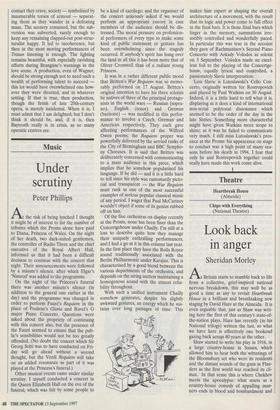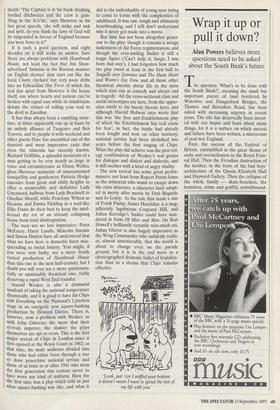Theatre
Heartbreak House (Almeida) Chips with Everything (National Theatre)
Look back in anger
Sheridan Morley
ABritain starts to stumble back to life from a collective, grief-inspired national nervous breakdown, this may well be as good a time as any to revisit Heartbreak House in a brilliant and breathtaking new staging by David Hare at the Almeida. It is even arguable that, just as Shaw was writ- ing here the first of this century's state-of- the-nation plays, Hare has recently (in his National trilogy) written the last, so what we have here is effectively one bookend gazing back across 80 years at the other.
Shaw started to write his play in 1916, in a large country-house in Sussex, which allowed him to hear both the witterings of the Bloomsbury set who were its residents and the distant sounds of the guns in Flan- ders as the first world war reached its cli- max. In that sense this is where Chekhov meets the apocalypse; what starts as a country-house comedy of appalling man- ners ends in blood and bombardment and death: 'The Captain is in his bunk drinking bottled ditchwater and the crew is gam- bling in the fo'c'sle,' says Shotover in his last great speech; 'she will strike and sink and split; do you think the laws of God will be suspended in favour of England because you were born in it?'
It is such a good question, and eight decades on it still seeks an answer. Sure there are always problems with Heartbreak House, not least the fact that this Shaw- advertised 'fantasia in the Russian manner on English themes' may start out like the local Cherry Orchard but very soon drifts into an Edwardian Hay Fever of which the real star apart from Shotover is the house itself, one where hearts and nations can be broken with equal ease while its inhabitants debate the virtues of selling your soul to the devil in Zanzibar.
It has thus always been a rambling struc- ture, at times apparently run up in haste by an unholy alliance of Turgenev and Ben Travers, and to people it with weekend and other guests Hare has assembled one of the starriest and most impressive casts that even the Almeida has recently known. Richard Griffiths, a splendid mountain of a man getting to be very nearly as large in voice and circumference as Orson Welles, gives Shotover moments of unaccustomed tranquillity and gentleness; Patricia Hodge cascades from great and chilly heights to offer a memorable and definitive Lady Utterword, halfway from Lady Bracknell to Ottoline Morell, while Penelope Wilton as Hesione and Emma Fielding as a waif-like Ellie Dunn do their best to keep the intel- lectual dry rot of an already collapsing house from total disintegration.
The men are no less impressive: Peter McEnery, Harry Landis, Malcolm Sinclair and Simon Dutton have all understood that what we have here is domestic farce mas- querading as social history. You might, if you were very lucky, see a more firmly rooted production of Heartbreak House than this one in the next half-century, but I doubt you will ever see a more quintessen- tially or unmissably theatrical one, richly deserving a rapid West End transfer. Arnold Wesker is also a dramatist unafraid of taking the national temperature theatrically, and it is good to have his Chips with Everything on the National's Lyttelton stage in an energetic new square-bashing production by Howard Davies. There is, however, now a problem with Wesker, as with John Osborne; the more that their revivals improve, the shakier the plays themselves are apt to seem. This is the first major revival of Chips in London since it first opened at the Royal Court in 1962; at that time, the male audience divided into those who had either been through a war or done peacetime national service and those of us born in or after 1941 who were the first generation this century never to have worn any kind of uniform. Here for the first time was a play which told us just what square-bashing was like, and what it did to the individuality of young men trying to come to terms with the complexities of adulthood. It was raw, tough and ultimately heartbreaking, and I still don't understand why it never got made into a movie.
But time has not been altogether gener- ous to the play; though it remains a savage indictment of Air Force regimentation, and though the ever-smiling Smiler is still a tragic figure (`Can't help it, Sarge, I was born that way'), I had forgotten how much the play owed at least in the first half to Seagulls over Sorrento and The Hasty Heart and Worm's Eye Kew and all those other theatrical sitcoms about life in the mess which start out as comedy and always end in tragedy. All the cross-sectional class and social stereotypes are here, from the upper- class misfit to the barely literate hero, and although Harold Hobson once wrote that this was `the first anti-Establishment play of which the Establishment has real cause for fear', in fact, the battle had already been fought and won on other territory; national service had been abolished two years before the first staging of Chips. What the play did achieve was the post-tril- ogy confirmation of Wesker's real genius for dialogue and dialect and dialectic, and it still seethes with a kind of angry vitality. The new revival has some great perfor- mances, not least from Rupert Penry-Jones as the aristocrat who wants to escape down the class structure, a character later adopt- ed in movie after movie by Dirk Bogarde and Jo Losey. In the role that made a star of Frank Finlay, James Hazeldine is a mag- nificently lugubrious Corporal Hill, and Julian Kerridge's Smiler could have wan- dered in from Of Mice and Men. On Rob Howell's brilliantly versatile wire-mesh set, Julian Glover is also hugely impressive as the Wing Commander who suddenly realis- es, almost unnoticeably, that the world is about to change even on the parade ground, but it is in the end more as a choreographed dramatic ballet of brutalisa- tion than as a drama that Chips remains effective.
`Look, just 'cos I sniffed your bottom it doesn't mean I want to spend the rest of my life with you.'



































































 Previous page
Previous page